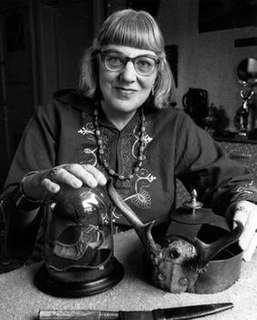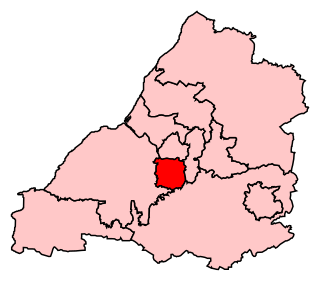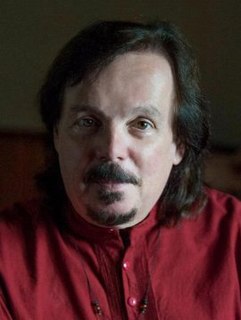Wicca is a modern Pagan religion. Scholars of religion categorise it as both a new religious movement and as part of the occultist stream of Western esotericism. It was developed in England during the first half of the 20th century and was introduced to the public in 1954 by Gerald Gardner, a retired British civil servant. Wicca draws upon a diverse set of ancient pagan and 20th-century hermetic motifs for its theological structure and ritual practices.

Witchcraft traditionally means the use of magic or supernatural powers to harm others. A practitioner is a witch. In medieval and early modern Europe, where the term originated, accused witches were usually women who were believed to have attacked their own community, and often to have communed with evil beings. It was thought witchcraft could be thwarted by protective magic or counter-magic, which could be provided by cunning folk or folk healers. Suspected witches were also intimidated, banished, attacked or killed. Often they would be formally prosecuted and punished, if found guilty or simply believed to be guilty. European witch-hunts and witch trials in the early modern period led to tens of thousands of executions. Although some folk healers were accused of witchcraft, they made up a minority of those accused. European belief in witchcraft gradually dwindled during and after the Age of Enlightenment.
Ronald Edmund Hutton is an English historian who specialises in Early Modern Britain, British folklore, pre-Christian religion and Contemporary Paganism. He is a professor at the University of Bristol, has written 14 books and has appeared on British television and radio. He held a fellowship at Magdalen College, Oxford, and is a Commissioner of English Heritage.

Doreen Edith Dominy Valiente was an English Wiccan who was responsible for writing much of the early religious liturgy within the tradition of Gardnerian Wicca. An author and poet, she also published five books dealing with Wicca and related esoteric subjects.

Bristol South is a constituency represented in the House of Commons of the UK Parliament since 2015 by Karin Smyth of the Labour Party.
Marian Green is a British author who has been working in the fields of magic, witchcraft and the Western Mysteries since the early 1960s.

Gary Charles Erbe, known as Raven Grimassi, was an American author of over 20 books, including topics on Wicca, Stregheria, witchcraft and neo-paganism. He popularized Stregheria, the religious practice of witchcraft with roots in Italy. Grimassi presented this material in the form of neo-paganism through his books. Raven had been a practitioner of witchcraft for over 45 years and was the co-director of the Ash, Birch and Willow tradition. He died of pancreatic cancer on March 10, 2019.

Janet Farrar is a British teacher and author of books on Wicca and Neopaganism. Along with her two husbands, Stewart Farrar and Gavin Bone, she has published "some of the most influential books on modern Witchcraft to date". According to George Knowles, "some seventy five percent of Wiccans both in the Republic and Northern Ireland can trace their roots back to the Farrars."
A solitary witch is one who chooses to practice their spiritual faith in the privacy of their home or other designated space, without the need to participate in a group such as that of a Wiccan coven; although it’s not uncommon for solitaries to participate in some communal activities. Many solitary practitioners are Neo-pagans, who adhere to a diverse group of pagan religions that include various forms of Wicca, Traditional Reconstructionism and Traditional British Witchcraft, among others. About half of all pagans are self-ascribed solitary practitioners.

Gavin Bone is an English author and lecturer in the fields of magic, witchcraft, Wicca and Neo-Paganism, and an organizer in the Neo-Pagan community. He was born in Portsmouth, Hampshire in England, in 1964.
T. Thorn Coyle is a Neopagan author and teacher from the United States of America. They practiced within the Feri and Reclaiming traditions of witchcraft before developing their own approach integrating other spiritual practices. Their writings include urban fantasy and instruction on magical spiritual practice.

Philip Heselton is a retired British conservation officer, a Wiccan initiate, and a writer on the subjects of Wicca, Paganism, and Earth mysteries. He is best known for two books, Wiccan Roots: Gerald Gardner and the Modern Witchcraft Revival and Gerald Gardner and the Cauldron of Inspiration, which gather historical evidence surrounding the New Forest coven and the origins of Gardnerian Wicca.

Wiccan morality is largely expressed in the Wiccan Rede: 'An' it harm none, do what ye will' - old-fashioned language for 'as long as you aren't harming anyone, do as you wish'. While this could be interpreted to mean "do no harm at all," it is usually interpreted as a declaration of the freedom to act, along with the necessity of thinking through and taking responsibility for the consequences of one's actions.

The Museum of Witchcraft and Magic, formerly known as the Museum of Witchcraft, is a museum dedicated to European witchcraft and magic located in the village of Boscastle in Cornwall, south-west England. It houses exhibits devoted to folk magic, ceremonial magic, Freemasonry, and Wicca, with its collection of such objects having been described as the largest in the world.

In Old Norse, seiðr was a type of magic which was practised in Norse society during the Late Scandinavian Iron Age. The practice of seiðr is believed to be a form of magic which is related to both the telling and the shaping of the future. Connected to the Old Norse religion, its origins are largely unknown, and the practice of it gradually declined after the Christianization of Scandinavia. Accounts of seiðr later made it into sagas and other literary sources, while further evidence of it has been unearthed by archaeologists. Various scholars have debated the nature of seiðr, some of them have argued that it was shamanic in context, involving visionary journeys by its practitioners.
Pagan studies is the multidisciplinary academic field devoted to the study of contemporary Paganism, a broad assortment of modern religious movements, which are typically influenced by or claiming to be derived from the various pagan beliefs of premodern Europe. Pagan studies embrace a variety of different scholarly approaches to studying such religions, drawing from history, sociology, anthropology, archaeology, folkloristics, theology and other religious studies.

The Atlantis Bookshop is an esoteric bookshop in Museum Street, London. Established by Michael Houghton in 1922, it is currently owned and run by Bali Beskin and her mother Geraldine.
Quest is an esoteric quarterly magazine containing material on magic, witchcraft, and practical occultism, along with personal experiences and reviews. It has been edited since its inception in 1970 by the author Marian Green, who also organises an associated annual Quest Conference.

Magic, Witchcraft and the Otherworld: An Anthropology is an anthropological study of contemporary Pagan and ceremonial magic groups that practiced magic in London, England, during the 1990s. It was written by English anthropologist Susan Greenwood based upon her doctoral research undertaken at Goldsmiths' College, a part of the University of London, and first published in 2000 by Berg Publishers.

Modern Paganviews on LGBT people vary considerably among different paths, sects, and belief systems. LGBT individuals comprise a much larger percentage of the population in neopagan circles than larger, mainstream religious populations. There are some popular neopagan traditions which have beliefs often in conflict with the LGBT community, and there are also traditions accepting of, created by, or led by LGBT individuals. The majority of conflicts concern heteronormativity and cisnormativity.











